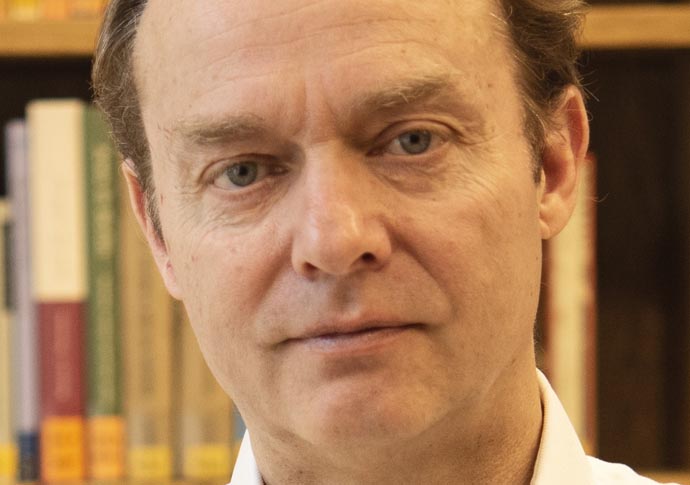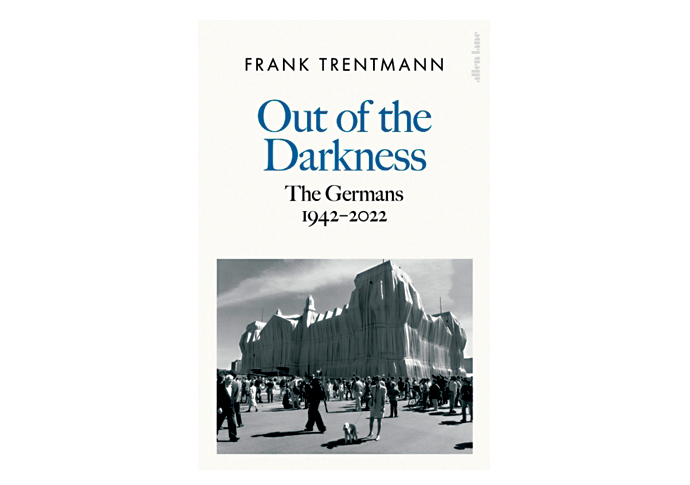Author probes the moral transformation of Germany – and ‘its limits’
Michael Church meets Hampstead-based Frank Trentmann, whose latest book was shortlisted for a major literary prize
Thursday, 5th December 2024 — By Michael Church

Professor Frank Trentmann
PROFESSOR of history at London University’s Birkbeck College, and author of a massive tome on German political and cultural history which has won acclaim all round the world, and has been voted a runner-up for the celebrated Wolfson History Prize: Frank Trentmann is a big literary fish.
Yet his professorial aquarium is what an estate agent might euphemistically describe as “cosy”, where he and I have just enough space to converse, squeezed face to face between canyons of books crammed floor-to-ceiling.
We’ve met to discuss Trentmann’s eminently readable and in some ways explosive book, Out of the Darkness: The Germans 1942-2022, which he describes as an assessment of his compatriots’ moral transformation “and its limits”. And in the course of a 50-minute chat I get a history lesson full of salutary surprises.
Nobody should need reminding of that uniquely generous welcome extended to close to one million refugees in 2015: the Germans’ moral transformation has been plain for all to see. Ask about those limits to it, however, and Trentmann begins by pointing out how deep-rooted the Germans’ central problem had been.
“What initially surprised me,” he says, “was that even in the middle of the Second World War, as they murdered civilians and Jews, many German soldiers were imbued with a Wagnerian sense of heroism. One young officer whose diary I came across was clearly imbued with the belief that he saw himself as a force for good, not for evil.”
And the next generation of soldiers – in the new post-war army – was ideologically split: “Between those saying we must go against orders if they contravene the rules of war, and those who said ‘What’s all this nonsense about democracy? Orders are orders. There’s no place for ethics on the battlefield’.” In the 1950s and 60s, says Trentmann, the veteran culture was still strong. “And the ease with which war-crimes were justified was striking.”
After the war, he adds: “Although the West German government acknowledged that Germany was responsible for the Holocaust, at home – and among themselves – most Germans would insist that they weren’t part of it. If you were to believe numerous surveys, you’d think the Nazi party was a tiny group. ‘Yes, the Nazis were Germans,’ people would say, ‘but not Germans like me!’” Yet the truth is that in the 1950s and 1960s most members of the West German judiciary and civil service were ex-members of the Nazi party.

Trentmann was born in 1965, and describes himself as a “child of the economic miracle and social democracy. And like most other children of my age, I was shielded from the dark past”.
In his high school the German history syllabus ended in 1933. In other words, we don’t want to talk about the war.
Trentmann remembers the fuss when a new young history teacher proposed screening a French documentary, Night and Fog (1957), showing graphic scenes of the concentration camps at the end of the war. “Before the screening, we all had to take a letter home, asking our parents if they would permit this.”
In the 1970s and 1980s Germany did have its own home-grown terrorists with the communist Baader-Meinhof gang and militant Neo-Nazis, and it has been slow to exorcise the ghosts of the past. Part of the reason lies in the fact that it was only when the two halves of Germany were reunited in 1990, that the West German memory culture with its focus on the Holocaust reached East Germany.
As Trentmann puts it, “the East German focus had been on Communist victims, not on Jews”.
There’s a different reason why Germany does not currently host pro-Palestine demonstrations like those seen weekly in London. Germany had pro-Palestine rallies in the late 1960s, with most students sporting the keffiyeh scarf, but this movement was eclipsed when the full force of the Holocaust was generally realised in Germany.
Historical guilt induced Germans to passionately support the state of Israel, and adherence to that led to the muzzling of any hint of anti-Zionism.
“At which point,” says Trentmann, “the keffiyeh became regarded as anti-Semitic. The British courts have always stressed the distinction between a critique of Israeli policies and anti-Semitism, but the German courts have not.”
Trentmann’s book ends in 2022. How does he feel Germany has done since?
“The growth of AfD [Alternative für Deutschland] is very troubling. In the recent elections, half of those who voted for it were not negative voters – they’ve really signed up to its right-wing programme. For many, a vote for the AfD is seen as the only way to send a signal to Berlin, where the rulers are seen as unaccountable and being simply interested in staying in power. It no longer deters many people that the AfD has a significant number of Fascists among its ranks.”
And in Trentmann’s view the international challenges simply reinforce the domestic ones. If Trump pulls out of Ukraine, Germany and the other NATO states will find it impossible to fill the hole. “And more and more people are saying ‘what have these wars in the Middle East and Ukraine got to do with us? We don’t need to be involved. Let’s just stay home, and look after our garden’.”
How does Trentmann view Angela Merkel? “She has a genuine sense of duty, and I respect her for that. But in times like ours, duty is not enough. She tended to respond to problems when they cropped up, instead of addressing their roots. When she left power, the German army was left with a few tanks that could not move, and planes that could not fly.”
Trentmann and his family have lived in Hampstead for the past 20 years. How German does he feel?
“I am a dual citizen – German and British – so I have a split identity. Sometimes my dreams switch from English to German.
“I do not believe in a national character, but I have come to be more aware of certain views and habits which I carry with me, thanks to my German upbringing. Especially a sense of responsibility, arising from the murderous past.”
• Out of the Darkness: The Germans 1942-2022, by Frank Trentmann, is published by Allan Lane